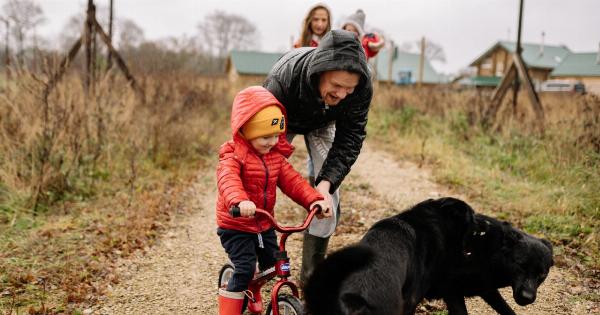Many people wonder whether it is really necessary to train their dogs. They may question if the time and effort required to train a dog is truly worth it. The truth is, training your dog is an essential part of being a responsible pet owner.
It not only benefits your dog’s well-being but also strengthens the bond between you and your furry friend. In this article, we will explore the various reasons why training your dog is indeed worth the time and effort.
1. Establishing Communication
Training your dog allows you to establish a clear means of communication with them. Dogs are intelligent creatures, but they do not understand human language by default.
Through training, you can teach your dog verbal commands and hand signals that they can comprehend. This enables you to give them instructions, set boundaries, and even prevent potential dangers. The ability to effectively communicate with your dog is invaluable in everyday interactions and can also prove crucial in emergency situations.
2. Creating a Harmonious Home Environment
Well-trained dogs are more likely to fit seamlessly into your household routine, making your home a harmonious environment for both you and your pet.
Dogs that have undergone training are familiar with basic commands such as “sit,” “stay,” and “lie down.” This makes it easier for you to manage their behavior and ensure that their presence in your home does not disrupt the daily activities of your family. A harmonious home environment also reduces stress levels for both you and your dog, promoting overall well-being.
3. Enhancing Safety
Training your dog significantly enhances their safety as well as the safety of those around them. Dogs that have been trained are less likely to engage in aggressive behavior, which can lead to potential harm to themselves or others.
They are more obedient, making it easier to keep them out of hazardous situations or away from harmful objects. For example, if your dog understands the command “leave it,” you can prevent them from consuming something toxic they may have picked up during a walk.
Training also helps in controlling your dog’s response to distractions, reducing the risk of accidents.
4. Strengthening the Bond
Training sessions provide an opportunity for you to spend quality time with your dog, strengthening the bond between you.
As you work together towards common goals, such as learning new tricks or mastering commands, you develop a mutual understanding and trust. This shared experience creates a deep emotional connection and fosters a sense of companionship. An unbreakable bond with your dog enhances not only your lives but also makes training an enjoyable and rewarding process for both of you.
5. Encouraging Good Behavioral Patterns
Proper training encourages good behavioral patterns in dogs at all stages of their lives. Whether you have a young puppy or an older dog, training can help in shaping their behavior and teaching them appropriate responses in different situations.
Through consistent reinforcement and positive reinforcement techniques, you can instill good habits, such as walking calmly on a leash, not jumping on guests, or not excessively barking. These good behavioral patterns make your dog a well-behaved companion and a pleasure to be around.
6. Improving Socialization
Dog training plays a crucial role in improving their socialization skills. When dogs are well-trained, they learn to interact positively with other dogs, animals, and humans.
This reduces the possibility of aggressive behavior or fear-based reactions in social situations. Dogs that have undergone proper socialization training are more confident and comfortable in various environments, and they are less likely to exhibit anxiety or stress when encountering new experiences.
Improved socialization skills contribute to a happier and more fulfilling life for your dog.
7. Assisting in Problem Solving
Dogs, just like humans, can face behavioral challenges or develop certain habits that are not desirable. Training can assist you in addressing and solving these problems effectively.
By understanding your dog’s behavior and motivations, you can implement training techniques that redirect or modify unwanted behaviors. This might include teaching alternative behaviors or using positive reinforcement to discourage problematic actions. Training can be a powerful tool in overcoming challenges and ensuring a well-rounded and contented dog.
8. Promoting Mental Stimulation
Dogs are intelligent animals that thrive on mental stimulation. Training exercises provide an excellent opportunity to engage your dog’s mind, prevent boredom, and improve their overall mental well-being.
Dogs that are mentally stimulated through training are less likely to develop destructive behaviors, such as chewing on furniture or excessive digging. They remain engaged, focused, and happy when given regular mental challenges and tasks to accomplish.
9. Allowing for Fun Activities
Training opens up a whole world of fun activities for you and your dog to enjoy together. Once your dog has mastered basic commands, you can progress to advanced training or teach them exciting tricks that are both entertaining and mentally stimulating.
Activities like agility training, scent games, or even participating in dog sports can provide outlets for your dog’s energy and keep them physically and mentally fit. These fun activities also strengthen the bond between you and your dog while adding joy and fulfillment to both of your lives.
10. Building a Well-Mannered Community
Well-trained dogs contribute to the overall well-being of the community. When your dog is trained and well-behaved, it is easier to bring them along to public places, such as parks or outdoor events, without causing disruption.
A community that is filled with responsible pet owners and well-mannered dogs is a safer and friendlier place for everyone. By investing the time and effort into training your dog, you become an active participant in building a harmonious community.
Conclusion
Training your dog is undoubtedly worth the time and effort.
It provides numerous benefits, including effective communication, a harmonious home environment, enhanced safety, a strong bond, good behavioral patterns, improved socialization, effective problem-solving, mental stimulation, engaging activities, and a well-mannered community. The training journey may require time, patience, and consistency, but the rewards far outweigh the investment. So, start training your dog today and embark on a fulfilling and rewarding experience that will last a lifetime!.


























